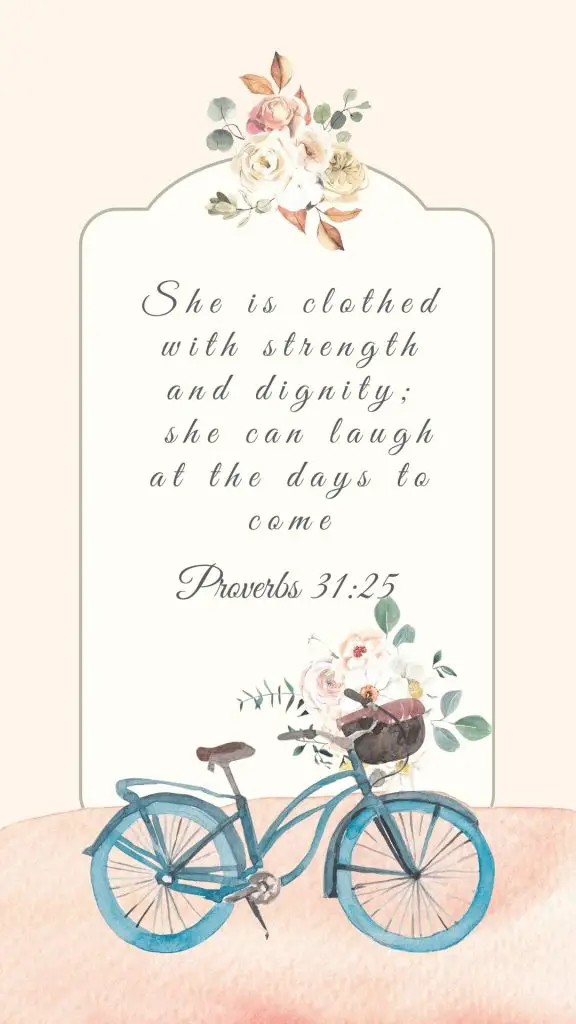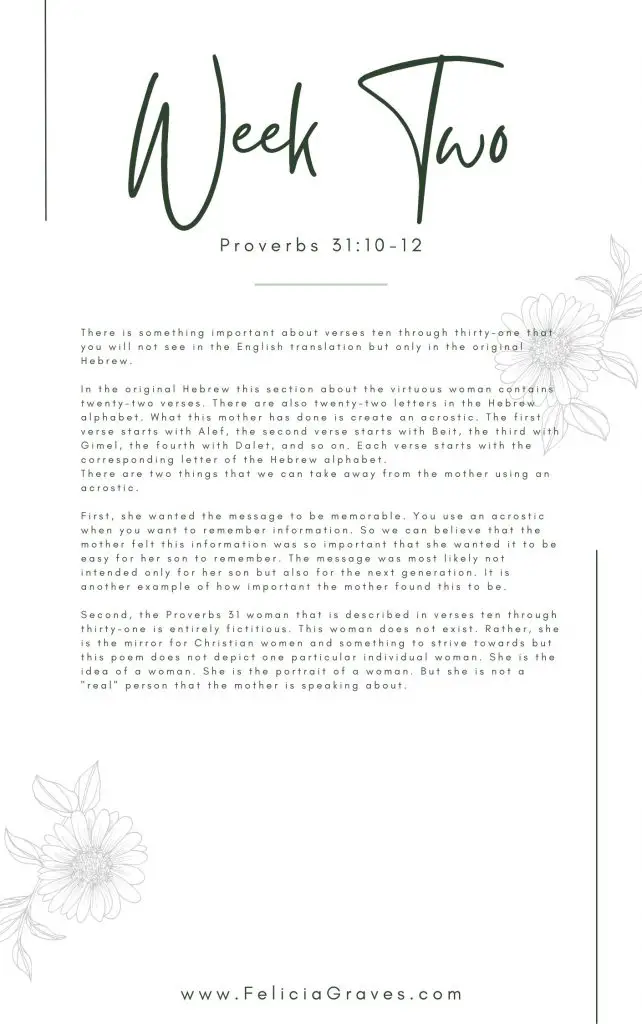Adult Sunday school classes are a wonderful blessing when it comes to Bible study and fellowship. Studying the Bible in small groups and discussing passages with other class members is a wonderful way to grow in your faith. God calls us read and study scripture but there are times that understanding God’s Word it not entirely clear.
In 2 Timothy 2:7 we read, “ Consider what I say, for the Lord will give you understanding in everything.” So often I have found that the experience and wisdom from Sunday school teachers or other young adults is one of the ways that the Lord helps me grow in my understanding of the Word of God.
What do you teach in a Sunday school lesson?
The first step in putting together this Bible study lesson was to decide what the theme or topic should be. I had about a million ideas at once but ultimately decided to go with one of my favorite passages from the Bible.
The entire Sunday School lesson can be downloaded for free at:
Proverbs 31:10-31 (CSB)
Who can find a wife of noble character?
She is far more precious than jewels.
The heart of her husband trusts in her,
and he will not lack anything good.
She rewards him with good, not evil,
all the days of her life.
She selects wool and flax
and works with willing hands.
She is like the merchant ships,
bringing her food from far away.
She rises while it is still night
and provides food for her household
and portions for her female servants.
She evaluates a field and buys it;
she plants a vineyard with her earnings.
She draws on her strength
and reveals that her arms are strong.
She sees that her profits are good,
and her lamp never goes out at night.
She extends her hands to the spinning staff,
and her hands hold the spindle.
Her hands reach out to the poor,
and she extends her hands to the needy.
She is not afraid for her household when it snows,
for all in her household are doubly clothed.
She makes her own bed coverings;
her clothing is fine linen and purple.
Her husband is known at the city gates,
where he sits among the elders of the land.
She makes and sells linen garments;
she delivers belts to the merchants.
Strength and honor are her clothing,
and she can laugh at the time to come.
Her mouth speaks wisdom,
and loving instruction is on her tongue.
She watches over the activities of her household
and is never idle.
Her children rise up and call her blessed;
her husband also praises her:
“Many women have done noble deeds,
but you surpass them all!”
Charm is deceptive and beauty is fleeting,
but a woman who fears the Lord will be praised.
Give her the reward of her labor,
and let her works praise her at the city gates.
Proverbs 31 Bible Study
If you are a Christian woman there is a very good chance that you have read this passage of the Bible before. You probably think that you have heard all that there is to be said about this virtuous woman and all of her wonderful attributes. Today, I am presenting to you a new way to look at the Proverbs 31 woman.
The Proverbs 31 woman is not intended to be a to-do list or a long inventory of all our shortcomings as women, mothers, and wives. Rather, the Proverbs 31 woman, the virtuous woman of legend, is a fictitious character from whom we can draw inspiration.

Beginning this adult Sunday school lesson
Throughout this lesson I have done my absolute best to provide a Sunday school curriculum that is Biblically based and true to the spirit of what God intended. However, I am a flawed person who makes mistakes. It is very likely that I have made some mistakes in this Bible study. I hope that you will recognize my heart and what this lesson aims to accomplish and in doing so forgive any human error.
The best way to overcome any misunderstandings of the text is through prayer, guidance from the Holy Spirit, discussion with your small group leader, and using the discussion questions with your class members. Of course you are encouraged and welcome to reach out to me if you feel that there is something that I should clarify or correct.
What to expect for your adult Sunday school group
The Sunday school lessons have been broken up into five weeks.
In each weekly lesson I will aim to present the main idea of that week’s reading by looking at the Bible verses for the week, historical context, and translate the Bible studies into how to apply what we have learned to our Christian faith and churches today.
The Bible study lessons will all include discussion questions. This is a great way for your adult Sunday school class to share personal experiences from their everyday life and apply that to God’s word. I encourage you to help the class to have an honest dialogue about the lesson topic. The important thing here is that we as Christian believers are coming together to study the Word and grow closer to Jesus Christ.
The entire Sunday School lesson can be downloaded for free at:
Week One
Reading: Proverbs 31:1-9
Opening discussion questions:
- How are women depicted in media today? What do you notice about women in advertising, on television, in movies, in songs, and in current literature?
- If you only looked at the ways the world represents women what would you think we value most in the modern woman?
- What kind of wife and mother is the modern woman?
- How does the modern woman spend her time?
- What are her goals?
- How does she dress?
- How does she speak?
- What does she spend money on?
Save your answers to all of these questions as we will be referring back to them in week five.
What is the message of Proverbs 31?
To better understand the virtuous woman described in Proverbs 31 it helps to first back up to the beginning of the chapter and take a look at what is happening there. This is important for context and to give us a better picture of what is happening.
Proverbs 31:1-2 (NIV)
“The sayings of King Lemuel—an inspired utterance his mother taught him. Listen, my son! Listen, son of my womb! Listen, my son, the answer to my prayers!”
In the first verse we learn that the author of this text is a mother and she is speaking to her son, a king. We do not know anything about King Lemuel. Some theologians believe that King Lemuel is a pseudonym for King Solomon but looking at the text we do not know that for sure.
However, we can assume that King Lemuel is a young king. We come to that conclusion because King Lemuel is still being given instruction from his mother and because that instruction we see here is about finding a wife. Young kings were not at all unheard of in ancient times so given this information it is a fair conclusion to draw.
In verse two the mother repeatedly tells her son to listen to her and calls him the son of her womb and the answer to her prayers. This is a mother who believes deeply that her son, this child that she cherishes, is a gift from God. He is an answer to her prayers and the result of the vows she made with her husband before God. By bringing those things up at the beginning of her speech we can see how important this message is to the mother.
Proverbs 31:3-9 (NIV)
“Do not spend your strength on women, your vigor on those who ruin kings. It is not for kings, Lemuel- it is not for kings to drink wine, not for rulers to crave beer, lest they drink and forget what has been decreed, and deprive all the oppressed of their rights. Let beer be for those who are perishing, wine for those who are in anguish! Let them drink and forget their poverty and remember their misery no more. Speak up for those who cannot speak for themselves, for the rights of all who are destitute. Speak up and judge fairly; defend the rights of the poor and needy.”
In verses three through nine the mother is giving her son instructions about sexual immorality, having your judgement dulled by being drunk, and helping those who are hurting. Ultimately, she is instructing her son to be a person of integrity and to deal fairly with other people.
All of the things that she has mentioned here deal with a person’s character. I think that we can learn something about this Jewish mother by the fact that the starting point of the message she wants to share with her son is his character. We know from verse two how very much it means to her to share this wisdom with her son and the very first thing that she wants him to hear is what kind of man he should grow up to be. His character.
Week One Discussion Questions
- What kind of woman do you imagine this Jewish mother to be?
- What kind of things do you think are important to her?
- What do you think she values most?
- What is something from today’s reading that stood out to you?
Week Two
Reading: Proverbs 31:10-12
There is something important about verses ten through thirty-one that you will not see in the English translation but only in the original Hebrew.
In the original Hebrew this section about the virtuous woman contains twenty-two verses. There are also twenty-two letters in the Hebrew alphabet. What this mother has done is create an acrostic. The first verse starts with Alef, the second verse starts with Beit, the third with Gimel, the fourth with Dalet, and so on. Each verse starts with the corresponding letter of the Hebrew alphabet.
There are two things that we can take away from the mother using an acrostic.
First, she wanted the message to be memorable. You use an acrostic when you want to remember information. So we can believe that the mother felt this information was so important that she wanted it to be easy for her son to remember. The message was most likely not intended only for her son but also for the next generation. It is another example of how important the mother found this to be.
Second, the Proverbs 31 woman that is described in verses ten through thirty-one is entirely fictitious. This woman does not exist. Rather, she is the mirror for Christian women and something to strive towards but this poem does not depict one particular individual woman. She is the idea of a woman. She is the portrait of a woman. But she is not a “real” person that the mother is speaking about.
Proverbs 31:10-12 (NIV)
“A wife of noble character who can find? She is worth far more than rubies. Her husband has full confidence in her and lacks nothing of value. She brings him good, not harm, all the days of her life.”
In verse ten the NIV translation has the word “rubies”. In other translations you might see the word “pearls” or “jewels”. The best translation for our understanding and historical significance here is “jewels”.
In the ancient world gold and jewels were how you could measure someone’s value or worth. It was not like today where you could go to a jewelry store and finance a necklace or ring. The materials were very precious in part because of how difficult they were to come by. Knowing that we have a more clear perspective on what kind of woman the mother is describing. A wife of noble character, an excellent wife, is so incredibly precious. She is saying, “Son, having this kind of wife is worth way more than any amount of wealth and it is worth more than any status symbol. A truly good wife is so valuable.”
What does Proverbs 31 say about a woman?
Next, in verses eleven and twelve we begin to look at the relationship between the husband and wife.
John Piper says, “The union of man and woman in marriage is a mystery because it conceals, as in a parable, a truth about Christ and the church. The divine reality hidden in the metaphor of marriage is that God ordained a permanent union between His Son and the church. Human marriage is the earthly image of this divine plan. As God willed for Christ and the church to become one body (Gal. 3:28; 1 Cor. 12:13), so He willed for marriage to reflect this pattern—that the husband and wife become one flesh (Gen. 2:24). It is no accident that human marriage provides language to explain Christ’s relation to the church (2 Cor. 11:2). For human marriage is the copy, not the original.”
The relationship between husband and wife, this beautiful design by God, is the most important relationship in the home. After speaking to her son about his character and telling him how important it is to find a good wife the first thing this wise Jewish mother tells her son about the woman he should marry is what kind of relationship the two of them should have.
Trust and no lack of gain
Verse eleven tells us that the husband can trust his wife completely. This is another place where some historical context will give us a more broad version of what the mother is saying to her son.
It was common during this time for a husband to lock up all of his valuables every time that he left the house. Arranged marriages were the norm and so it was not at all uncommon for a man to not trust his wife. They were not marriages built out of love. So in order to protect the family resources while he was gone the husband would lock everything up.
In verse eleven the mother is telling her son about something altogether different. She is describing a woman who is trustworthy. A woman whose husband can depend on her and know he will not come home to find everything he had worked for had be squandered away.
The end of verse eleven here is translated as “lacks nothing of value” but other translations say “not lack anything good” or “no lack of gain”. What the text is trying to tell us here is that the husband does not lose what he has worked for. The money that he has worked hard to provide for the family is not lost with ill spending or misuse when he is away.
Consumed with his best interest
Verse twelve may remind you of your wedding vows, “for better or worse, in sickness and in health”. King Lemuel’s mother knows that there will be hard days in any marriage. Even if you have a very happy marriage based on love and trust there will be hard times and difficult seasons. But even during the hard times the virtuous woman is building up her husband rather than tearing him down.
This excellent wife is not gossiping about her husband’s faults or tearing down his character. She is building him up. She is consumed with his best interest. All the days of her life, even on the bad days or maybe especially on the bad days, she wants good things for her husband.
Week Two Discussion Questions
- What words would you use to describe the character of the virtuous woman based on verses eleven and twelve?
- Can you think of anyone you know who has similar characteristics?
- What challenges might a woman come up against if she were trying to live out verses eleven and twelve in her home and marriage?
- We have discussed why King Lemuel’s mother thought her message was so important. Even more noteworthy is that the message is included in the Bible. What does it tell you about God that He included this in His Word? What does that make you think of?
Week Three
Reading: Proverbs 31:13-24
This week we will be discussing the excellent wife and her role as a homemaker. There are a few things to note about the duties of a homemaker in ancient times versus today.
The specific tasks that are mentioned here are reflected of the time that they were written. There is not going to be a verse about dishwashers or television but there are verses about providing food and idleness. When we are going through these verses it is important to look at historical context and to understand how then do these verses apply to the modern homemaker.
God is not telling us that in order to be an excellent wife you need to assemble a mattress from straw, spin thread, and sew together your own blankets. That does not mean that these verses do not apply to us today. There is still a lot to learn here that Christian women can apply to their modern homemaking. The specific tasks that are mentioned will be different from what a modern homemaker does but the spirit in which they are done, the heart behind the work, and the message are still just as relevant.
Opening discussion questions:
- What does the word “homemaker” make you think of?
- Does “homemaker” imply a certain employment status?
- What image comes to mind when you think about homemakers?
Proverbs 31:13-24 (NIV)
“She selects wool and flax and works with eager hands. She is like the merchant ships, bringing her food from afar. She gets up while it is still night; she provides food for her family and portions for her female servants. She considers a field and buys it; out of her earnings she plants a vineyard. She sets about her work vigorously; her arms are strong for her tasks. She sees that her trading is profitable, and her lamp does not go out at night. In her hand she holds the distaff and grasps the spindle with her fingers. She opens her arms to the poor and extends her hands to the needy. When it snows, she has no fear for her household; for all of them are clothed in scarlet. She makes coverings for her bed; she is clothed in fine linen and purple. Her husband is respected at the city gate, where he takes his seat among the elders of the land. She makes linen garments and sells them, and supplies the merchants with sashes.”
Clothing
In verse thirteen the woman is gathering supplies that she needs in order to make clothing and blankets. Wool was used for winter clothes and flax was turned into linen that was used for summer clothes.
Food
Next in verse fourteen we read that she would go out to the ships to get different food. Unlike today where we have grocery stores with large selections of food if a family wanted to have some variety in their meals it would require going long distances on foot. The woman described here is going out of her way to obtain special food for her family so they can have delicious meals with more variety.
In a typical household during this time everyone would wake up at dawn, quickly eat breakfast, and then start work. In verse fifteen we see that the woman is waking up before dawn, before the other members of the household, to start preparing food for her family. She is also preparing food for her female servants. Today, if you want a piece of buttered toast it is a very simple task that takes almost no time to prepare. In that time someone had to grind the grain to make flour in order to make bread. You had to milk the cow, skim the cream, and churn the butter. One of the responsibilities of this woman was to prepare food and feed her family which required a lot of work.
As I mentioned in this week’s introduction we are not required to spin our own thread, grind our grain, or churn our butter as a part of our modern homemaking. So how then do these verses apply to us today? What can we learn from the devotion that this woman has to her family? How can we apply that to our modern homemaking?
One thing that I notice from these verses is the devotion that she has for her family. I see that she takes her responsibilities seriously and that her family’s well-being is important to her. She is putting the needs of her family above even her own.
Continuing
The entire Sunday School lesson can be downloaded for free at:





Very nice layout of this study.. and timely one. Thank you.
Thank you so much for sharing this study Felicia. I am excited to dig in more to learn from the Proverbs 31 woman! My current church does not have Sunday School, and I do miss it greatly!
What a wonderful post. This has been on my mind for a while now and I love the discussion questions you chose to guide us in studying this passage. Proverbs 31 woman is a woman that I try to let inspire every aspect of my life.